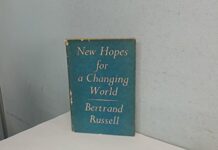
Ebook Info
- Published: 2012
- Number of pages: 88 pages
- Format: PDF
- File Size: 0.04 MB
- Authors: Bertrand Russell
Description
This book was converted from its physical edition to the digital format by a community of volunteers. You may find it for free on the web. Purchase of the Kindle edition includes wireless delivery.
User’s Reviews
Reviews from Amazon users which were colected at the time this book was published on the website:
⭐Philosophers usually direct their writings towards their fellow philosophers rather than to the general reader, thus making the pursuit of philosophy a difficult and frustrating task for anyone falling into the latter category. Most philosophical works expect the reader to know the entire history of Western thought leading up to the work in question. Every once in a while, however, some benevolent philosopher will come along and write an accessible text that serves as an inviting entryway into the discipline. Bertrand Russell’s 1912 book The Problems of Philosophy is one of the better examples of a philosophical primer. Rather than the usual chronological approach to such books, Russell proceeds thematically, addressing a series of philosophical questions, with each topic building upon the knowledge acquired in the previous chapter. Though Russell references other philosophers like Plato, Descartes, Kant, and Hegel, the reader is not required to have prior familiarity with any of their works in order to comprehend the philosophical concepts being discussed.That’s not to say the book is an easy read. Russell doesn’t dumb down any of his ideas in order to pander to an audience of philosophical novices. He does, however, express philosophical concepts in a plain and simple vocabulary that general readers can understand. No knowledge of disciplinary jargon is required; Russell defines all the terms necessary for understanding his argument. His prose can get convoluted at times when the complex subject matter requires it, but there’s nothing that precludes a diligent reader from fully appreciating the text. Throughout the book he uses examples and analogies from everyday life that are easily comprehensible.As a title, The Problems of Philosophy is a little misleading, or at least too broad. A more fitting title (though less inviting) would have been The Problems of Epistemology because Russell is almost exclusively concerned here with the particular branch of philosophy that deals with the theory of knowledge—how we perceive the reality around us and form beliefs as to what is true or false. This book only touches on metaphysics and doesn’t cover ethics at all. Russell does delve rather deeply into the territory of logic, which is essentially the application of mathematical principles to language or ideas in order to differentiate between truth and falsehood. He begins by questioning the difference between appearance and reality. To what extent can we be certain that the information we gather through our senses reflects the true nature of reality? From there he proceeds to discuss the existence and nature of matter. Subsequent chapters go on to explain how we acquire knowledge from sense data and inductive reasoning, how we form a priori judgements, and why we sometimes harbor erroneous beliefs. Although the book primarily advances Russell’s own ideas on these subjects, he does give due consideration to theories and philosophies that oppose his own, so the reader gets a well rounded perspective on each topic.I’ve often wondered why Russell was awarded the Nobel Prize in Literature even though he is a mathematician, logician, and philosopher. After reading this book, one sees how the elegant quality of his prose serves to enlighten readers and expand their perspective. Russell was a master of language as well as mathematics. His concluding chapter on the value of philosophy is positively inspiring. This excellent book not only provides stimulating insight into the processes of human thought; it also opens your mind to new ways of thinking about reality.
⭐Bertrand Russell introduces the reader to the subject of philosophy in this book. He does not simply talk about philosophical “problems” in the manner of an introductory textbook. Instead, he critically explores areas of controversy among philosophers. His method is to break down “propositions” (big unanswered questions) into their underlying assumptions, test their validity from various perspectives (e.g. a priori, existential, rational), then build back up to a conclusion, all in the same manner of thinking used by professionals in the field.Russell’s writing stands out for its clarity and logical flow. Even so, this is a difficult book to understand on first reading for one with no background in the subject. I found myself rereading sections often to grasp the detailed flow of arguments. At times I wondered “why bother” with such detail about a matter that seems like common sense. Yet in the final analysis, one ends up understanding that “obvious” fact of life in greater depth and with higher confidence than before. For example, to explore the question, “how can we know what is true,” Russell first explores “what is truth” and “what is falsehood.” Once established, delving into beliefs and the nature of knowledge simplifies.The final chapter is the best. Russell presents his views on why the study of philosophy is worthwhile, namely, to free your mind from the strictures of conformity, social norms, false assumptions and limited thinking. This chapter is the reader’s reward for ploughing through the rest of the book, and it is definitely a worthwhile journey.The appendix lists a few ideas for further reading. These resources tie into material by philosophers that Russell discusses throughout the text. He advocates learning philosophy by reading original materials, not texts or books “about” philosophy. Having digested this much information about the subject, presented by one of the great philosophers, Bertrand Russell, I am eager to read more. As far as an Amazon rating goes, I deduct one star over the lack of chapter summaries and introductions, for the lay reader, that might make this a more interesting and memorable read for non-philosophers. Do not let that dissuade you from reading this book; if you are reading this review you likely have enough interest in the subject to make “The Problems of Philosophy” very interesting to you. Enjoy!
Keywords
Free Download The Problems of Philosophy in PDF format
The Problems of Philosophy PDF Free Download
Download The Problems of Philosophy 2012 PDF Free
The Problems of Philosophy 2012 PDF Free Download
Download The Problems of Philosophy PDF
Free Download Ebook The Problems of Philosophy





